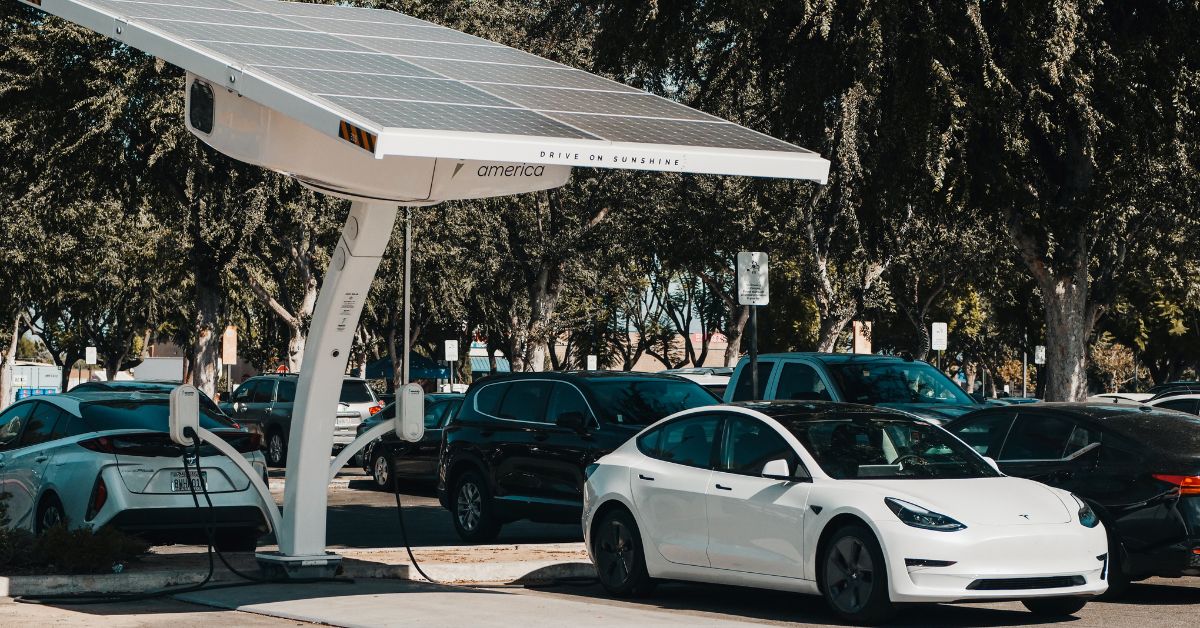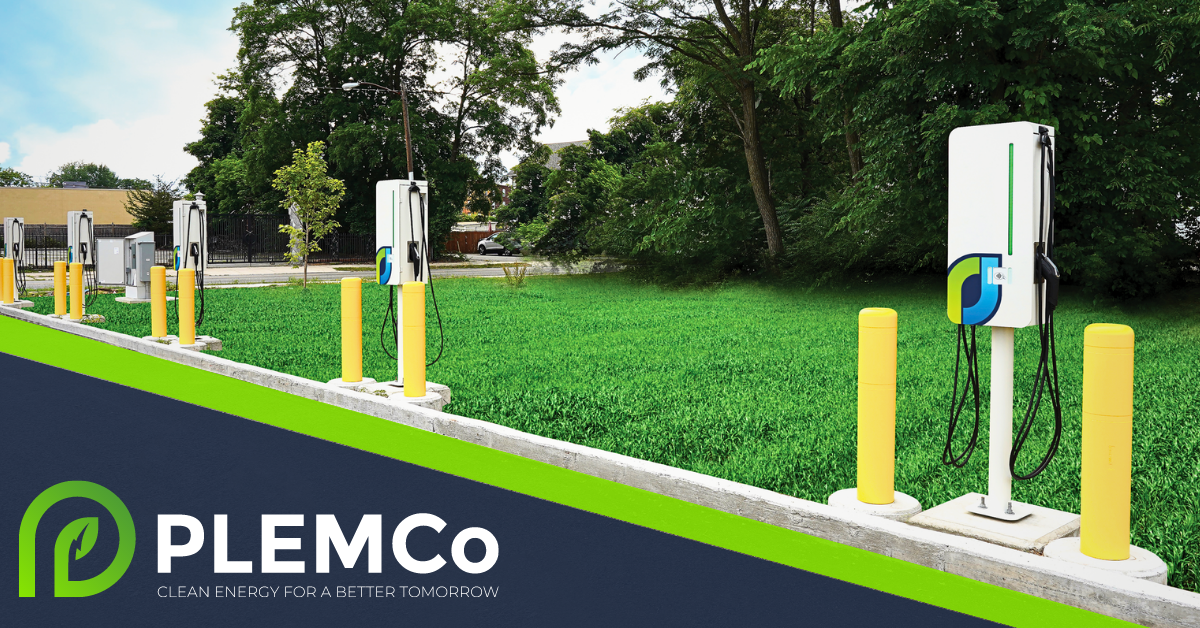Electric Vehicle Chargers for Business Owners
ev charging stations help the environment and attract ev drivers
4 min read
-1.png) PLEMCo Blog
:
Jun 13, 2023 9:00:00 AM
PLEMCo Blog
:
Jun 13, 2023 9:00:00 AM

The global market for electric vehicles (EVs) is expanding rapidly, driven by increasing consumer demand and government initiatives. With more EVs on the road, the demand for charging infrastructure is also growing.
There is a significant opportunity for entrepreneurs and property owners to establish charging stations as a profitable business model. Creating a successful EV charging station business model requires a deep understanding of the market and the needs of EV drivers. This article will explore the critical components of creating a successful business model for EV charging stations through market research.
Market research is a critical component of creating a successful business model for EV charging stations. It involves gathering data on the market size, competition, customer needs, and pricing strategies.
By conducting market research, businesses can gain a comprehensive understanding of the EV market, which can help them identify gaps and opportunities.
To begin an EV charging station business, one must ensure the market has ample demand. Understanding the number and types of EVs and charging requirements is critical in determining the success of the venture.
Analyzing market trends, government policies, and technological advances is necessary for keeping ahead of the competition and planning for future growth.
Location is essential to maximizing profits, and businesses must consider factors such as local infrastructure, population density, and accessibility. Ultimately, providing quality services and remaining profitable are key to the success of an EV charging station business.
Knowing the competition is essential for any business to prosper, including EV charging stations. In gaining knowledge of other charging stations nearby, companies can acquire valuable information regarding pricing strategies, location, and customer experience.
This data can help enhance their business operations and make informed marketing and pricing decisions. Additionally, businesses can pinpoint opportunities and gaps in the market to take advantage of.
Examining the pros and cons of rival EV charging stations is equally crucial. This information can aid businesses in establishing their unique selling proposition (USP) and distinguish themselves from competitors. It can help businesses customize their services to meet their target market's needs and attract new customers.
Furthermore, comprehending the competition can help businesses keep up with ever-changing markets. With new players continuously entering the market, businesses must stay on top of the latest trends and technologies to stay competitive.
Businesses can identify upcoming trends and technologies and incorporate them into their own operations. This approach not only keeps them ahead of the game, but it also enhances their overall customer experience and satisfaction.
Understanding customer needs is crucial to creating a successful business model. Conduct surveys or focus groups to gather information on the needs and preferences of EV drivers in the area.
This can include charging speed, payment methods, availability, and location. By understanding the needs of customers, businesses can tailor their offerings to better meet their needs and increase customer satisfaction.
It is crucial to comprehend the needs of customers for a business model to succeed. The initial step for this process involves obtaining information on EV drivers' preferences and requirements in the locality. Information can be acquired with focus groups or surveys.
These both offer useful insights into customers' payment options, location, availability, and charging speed preferences. By analyzing these needs, businesses can personalize their services to fulfill the requirements of their clients.
Gathering customer information through surveys or focus groups provides businesses with valuable information about their preferences and needs. This data can be used to refine products and services to meet customer preferences and to develop targeted marketing campaigns.
Suppose a large number of electric vehicle drivers express a demand for fast-charging options. In that case, businesses can invest in high-speed charging infrastructure. On the other hand, if customers require mobile payment alternatives, businesses may choose to prioritize mobile payment solution development.
Understanding customer requirements is fundamental for a thriving business model. By gathering information on EV driver's requirements and preferences in the area, businesses can adapt their services to satisfy clients' needs. This approach enhances customer satisfaction builds brand loyalty and ultimately improves business growth.
Determining the pricing approach for electric vehicle (EV) charging stations demands careful consideration of multiple factors. One essential aspect is electricity costs, which can fluctuate based on location and time of day.
Equipment costs also contribute significantly to the overall expense of the charging station. In addition, businesses must analyze rivals' pricing tactics in their region and formulate a competitive and profitable strategy.
Considering client requirements is also critical in developing a pricing strategy that meets the demands of EV charging stations. Many EV drivers aim to save on fuel costs and prioritize stations with affordable rates.
Still, some may pay more for faster charging times or greater convenience. Understanding consumer needs allows businesses to tailor pricing to their target market and draw more clients.
Finally, competition is the cornerstone of an effective pricing strategy. This suggests analyzing rivals' pricing tactics in your area. Market trends and the overall demand for EV charging stations in a given location.
Customers may avoid the more expensive charging stations, yet very low charging fees may not be feasible in the long run. The key to success in the EV charging station industry lies in striking a balance between profitability and competitiveness.
Developing a robust business model is crucial for any company looking to succeed in the competitive market. A well-crafted business model outlines a comprehensive plan for delivering value to customers and generating revenue for the organization.
It is a roadmap that charts the course of a company's growth and success in the long run. This outlines how a company will create and deliver value to its customers and generate revenue. In the case of EV charging stations, there are several business models to consider:
A subscription model involves charging customers a monthly fee for access to charging stations. This model can be an attractive option for businesses as it provides a consistent revenue stream and encourages customer loyalty. This model is best suited for areas with a high concentration of EV drivers who require frequent charging.
A pay-per-use model involves charging customers for each charging session. This model allows businesses to charge based on usage, which can be beneficial for customers who only need to charge occasionally. This model is best suited for areas with a lower concentration of EV drivers.
An ad-supported model involves providing free charging to customers in exchange for viewing advertisements. This model can be an attractive option for businesses that want to attract customers and generate revenue from advertising. This model is best suited for high-traffic areas where there is a high demand for charging stations.
Want your commercial property or business to grow with the EV market? Visit PLEMCo's website for expert assistance on market research and profitable business planning.

ev charging stations help the environment and attract ev drivers

claiming federal EV tax credits

COMMERCIAL EV CHARGING OPPORTUNITIES